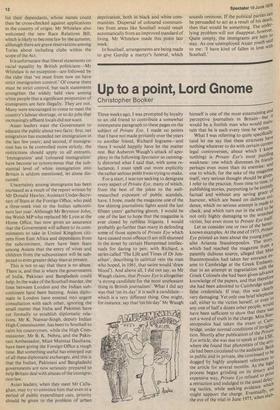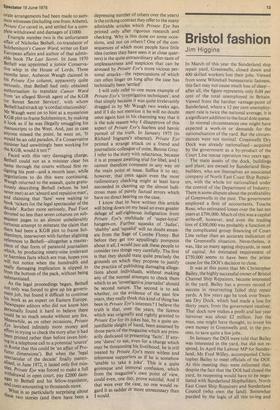Up to a point, Lord Gnome
Christopher Booker
Three weeks ago, I was prompted by loyalty to an old friend to contribute a somewhat intemperate paragraph to these pages on the subject of Private Eye. I made no points that I have not made privately over the years to another friend, Richard Ingrams—and there I would happily have let the matter rest. But Auberon Waugh's attack of apoplexy in the following Spectator so cunningly distorted what I said that, with some reluctance, I must spell out more explicitly the rather serious point I was trying to make.
For a start, I was not seeking to denigrate every aspect of Private Eye, many of which, from the best of the jokes to the wellresearched exposure of public scandals, have, I hope, made the magazine one of the few shining journalistic lights amid the last fifteen years' gathering gloom. I would be one of the last to hope that the magazine is ever closed by ruthless litigants. I would probably go further than many in defending some of those aspects of Private Eye which have caused most offence (I am still shunned in the street by certain Hampstead intellectuals for daring to pen, with Richard, a series called 'The Life and Times of Dr Jonathan', describing in satirical vein the man who hoped, in 1961, that satire would 'draw blood'). And above all, I did not say, as Mr Waugh claims, that Private Eye is altogether 'a strong candidate for the most unpleasant thing in British journalism'. What I did say was that 'on its day' it is such a candidate— which is a very different thing. One might, for instance, say that 'on his day' Mr Waugh himself is one of the most entertaining an perceptive journalists in Britain—but would be a foolish man who would main tam that he is such every time he writes. What I was referring to quite specificallY (and let me say that these strictures have nothing whatever to do with certain current legal controversies, about which 1 know nothing) is Private Eye's most puzzling weakness: one which distresses its friends perhaps even more than its enemies: and one to which, for the sake of the magazine itself, very serious thought should be given; I refer to the practice, from time to time, di publishing stories, purporting to be entirely factual and without any saving grace 0.1 humour, which are based on dubious evi
to to dence, which' no serious attempt is made check, and which turn out in the end to he not only highly damaging to the wretchee. victim, but even more to Private Eye itselt.
Let us consider one or two of the better" known examples. At the end of 1973, Priral( Eye printed an item about the young iournalist Arianna Stassinopoulos. The stofl. which had reached the magazine frog'. 3 patently dubious source, alleged that Miss Stassinopoulos had taken her entrance ex" ams to Cambridge at the Greek Em that in an attempt at ingratiation with the Greek Colonels she had been given advance knowledge of the papers, and that therefore under bassy,
she had been admitted to Cambridge
false credentials. If true, this was clearlY very damaging. Yet only one brief telephone call, either to the victim herself, or even 1°. any one of half a dozen other people, woula have been sufficient to show that there was not a word of truth in the charge. Miss Stassinopoulos had taken the exam at Ca.01 bridge, under normal conditions of invigila Potion. Shortly after publication of the . vate Eye article, she was due to speak at the where she found that photostats of the article had been circulated to the audience. Bo.tn in public and in private, she continued to De dogged by highly unpleasant references the article for several months. As the !eg! process began grinding on its dreary are; expensive way, Private Eye refused to Prin, a retraction and indulged in the usual delay nn ing tactics, while seeking evidence Whic might support the charge. EventuallY, the eve of the trial in June 1975, when Oa° orate arrangements had been made to summon witnesses (including one from Athens), Private Eye caved in, and settled for a comPlete withdrawal and damages of £1000.
Example number two is the unfortunate affair of Nicholas Bethell, co-translator of Solzhenitsyn's Cancer Ward, writer on East European affairs and author of that admirable book The Last Secret, In June 1970 Bethell was appointed a junior Conservative whip in the House of Lords. Three months later, Auberon Waugh claimed in his Private Eye column, apparently quite seriously, that Bethell had only obtained authorisation to translate Cancer Ward from 'an alleged Slovak agent of the KGB (or Soviet Secret Service)', with whom Bethell had struck up 'a cordial relationship'. Mx Waugh went on to hint at a mysterious KGB plot to frame Solzhenitsyn, by making it look as if he was illegally smuggling his manuscripts to the West. And, just in case anyone missed the point, he went on, 'It would be an odd paradox, if a Conservative minister had unwittingly been working for the KGB, would it not?'
Faced with this very damaging charge, Bethell could not as a minister clear his name through the courts without first resigning his post—and a month later, while negotiations to do this were continuing, Waugh returned to the assault, quite gratuitously describing Bethel! (whom he had never met) as an 'absurd and repulsive man', and claiming that 'fans' were waiting to book 'tickets for the legal spectacular of the decade'. Rather more seriously, Paul Foot devoted no less than seven columns on subsequent pages to an almost unbelievably tortuous attempt to reiterate the claim that there had been a KGB plot to frame Solzhenitsyn, interwoven with further slighting references to Bethell—altogether a masterPiece of that form of paranoid journalism Which, by producing ninety-nine irrelevant or harmless facts which are true, hopes you Will not notice when the hundredth and really damaging implication is slipped in from the bottom of the pack, without being substantiated.
As the legal proceedings began, Bethel1 not only was forced to give up his governMent job, but found it difficult to continue hiS work as an expert on Eastern Europe. "ewspaper editors who did not know him Personally found it hard to believe there could be so much smoke without any fire.
Meanwhile, as on other occasions, Private EYe lavished infinitely more money and effort in trying to check the story after it had .°een printed rather than before (even hint ing In a telephone call to a potential 'source' kome that this could be 'an affair of Prourn° dimensions'). But when the 'legal spectacular of the decade' finally materialised, in June 1972, it lasted only five mites. Private Eye was forced to make a full Withdrawal in open court, pay £2000 damages to Bethell and his fellow-translator, and costs amounting to thousands more. thWhat is so particularly surprising about ese two stories (and there have been a depressing number of others over the years) is the striking contrast they offer to the many admirable articles which Private Eye has printed only after rigorous research and checking. Why is this done on some occasions, and not on others? One of the consequences of which most people have little idea (unless they have seen it at close quarters) is the quite extraordinary after-taste of unpleasantness and suspicion that can be aroused by Private Eye's more vicious personal attacks—the repercussions of which can often linger on long after the case has technically been 'settled'.
1 will only refer to one more example of Private Eye's 'investigative techniques', and that simply because It was quite irrelevantly dragged in by Mr Waugh two weeks ago, and if I do not mention it he will no doubt once again hint in his charming way that it is the sole reason why I disapprove of this aspect of Private Eye's fearless and heroic pursuit of the truth. In January 1975 (in Richard Ingrams's absence), Private Eye printed a strange attack on a friend and journalistic colleague of mine, Bennie Gray. I refer to the story with reluctance, because it is at present awaiting trial for libel, and I cannot therefore comment in any way on the main point at issue. Suffice it to say, however, that once again even the most rudimentary checking might at least have succeeded in cleaning up the almost ludicrous mass of purely factual errors which have no direct bearing on the case.
I know that to have written this article will bring down on my head an even greater deluge of self-righteous indignation from Private Eye's multitude of 'super-loyal' hangers-on. Further squeaks of 'Judas', 'shabby' and 'squalid' will no doubt emanate from the Sage of Combe Florey. But before they get too appallingly pompous about it all, I would just ask these people to consider two things very carefully. The first is that they should state quite precisely the grounds on which they propose to justify the practice of publishing damaging allegations about individuals, without making any of the normal attempts to check them which to an 'investigative journalist' should be second nature. The second is to ask whether, on the evidence of the past few years, they really think this kind of thing has been in Private Eye's interests? I believe the truth is that, over the years, the licence which was originally and rightly granted to Private Eye for its Jokes has, by a quite unjustifiable sleight of hand, been assumed by those parts of the magazine which are primarily dedicated to presenting 'facts'. If anyone 'dares' to sue, even for a charge which may be threatening his livelihood, he is still treated by Private Eye's more witless and inhumane supporters as if he is somehow 'unable to take a joke'. This is a quite grotesque and immoral confusion, which from the magazine's own point of view, could even, one day, prove suicidal. And if that were ever the case, no one would regard it as sadder or more unnecessary than I would.



































 Previous page
Previous page